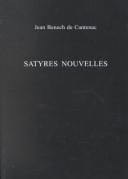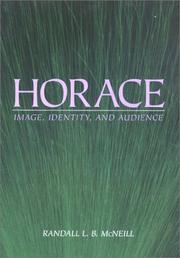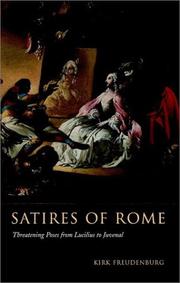| Listing 1 - 3 of 3 |
Sort by
|

ISBN: 0859896919 Year: 2001 Volume: 113 Publisher: Exeter : University of Exeter Press,
Abstract | Keywords | Export | Availability | Bookmark
 Loading...
Loading...Choose an application
- Reference Manager
- EndNote
- RefWorks (Direct export to RefWorks)
French poetry --- Verse satire --- Poésie française --- Poésie satirique --- Poésie française --- Poésie satirique

ISBN: 0801866669 0801876516 9780801876516 9780801866661 Year: 2001 Publisher: Baltimore Johns Hopkins University Press
Abstract | Keywords | Export | Availability | Bookmark
 Loading...
Loading...Choose an application
- Reference Manager
- EndNote
- RefWorks (Direct export to RefWorks)
This volume will interest scholars of Horace, Latin poetry, rhetoric, as well as those interested in the cultural studies aspect of persona and identity.
Epistolary poetry, Latin --- Laudatory poetry, Latin --- Verse satire, Latin --- History and criticism. --- -Laudatory poetry, Latin --- -Verse satire, Latin --- -Latin verse satire --- Latin poetry --- Latin laudatory poetry --- Latin epistolary poetry --- History and criticism --- Horace --- -Horace --- Orazio --- Horacij Flakk, Kvint --- Criticism and interpretation --- Rome --- In literature. --- Poésie élogieuse latine --- Poésie épistolaire latine --- Poésie satirique latine --- Histoire et critique --- Rome dans la littérature --- In literature --- Criticism and interpretation. --- Horatius Flaccus, Quintus --- Horatius Flaccus, Q. --- Gorat︠s︡īĭ --- Gorat︠s︡iĭ Flakk, Kvint --- Horacij --- Horacio, --- Horacio Flaco, Q. --- Horacjusz --- Horacjusz Flakkus, Kwintus --- Horacy --- Horaṭiyos --- Horaṭiyus --- Horats --- Horaz --- Khorat︠s︡iĭ --- Khorat︠s︡iĭ Flak, Kvint --- Orazio Flacco, Quinto --- הוראציוס --- הורטיוס

ISBN: 052100621X 0521803578 1107123402 051117487X 0511041586 0511154968 0511328559 0511612982 1280433302 0511043805 9780511041587 9780521803571 9780521006217 9780511612985 9780511043802 9780511154966 9781280433306 9781107123403 9780511328558 Year: 2001 Publisher: Cambridge : Cambridge university press,
Abstract | Keywords | Export | Availability | Bookmark
 Loading...
Loading...Choose an application
- Reference Manager
- EndNote
- RefWorks (Direct export to RefWorks)
This survey of Roman satire locates its most salient possibilities and effects at the center of every Roman reader's cultural and political self-understanding. This book describes the genre's numerous shifts in focus and tone over several centuries (from Lucilius to Juvenal) not as mere 'generic adjustments' that reflect the personal preferences of its authors, but as separate chapters in a special, generically encoded story of Rome's lost, and much lionized, Republican identity. Freedom exists in performance in ancient Rome: it is a 'spoken' entity. As a result, satire's programmatic shifts, from 'open' to 'understated' to 'cryptic' and so on, can never be purely 'literary' and 'apolitical' in focus and/or tone. In Satires of Rome, Professor Freudenburg reads these shifts as the genre's unique way of staging and agonizing over a crisis in Roman identity. Satire's standard 'genre question' in this book becomes a question of the Roman self.
Verse satire, Latin --- History and criticism. --- Lucilius, Gaius, --- Persius --- Juvenal --- Horace --- Criticism and interpretation. --- Rome --- In literature. --- Rome -- Dans la littérature --- Rome -- In de literatuur --- Rome -- In literature --- Rome dans la littérature --- Rome in de literatuur --- Rome in literature --- Poésie satirique latine --- Histoire et critique --- Rome dans la littérature --- In literature --- History and criticism --- Orazio --- Horacij Flakk, Kvint --- Persjusz Flakkus, Aulus --- Perse --- Persius Flaccus, Aulus --- Flaccus, Aulus Persius --- Persius, Paulus Flaccus --- Persio --- Aulus Persius Flaccus Volateris --- Giovenale, D. Giunio --- Juvenalis, Decimus Junius --- Juvénal --- Horatius Flaccus, Quintus --- Iuvenalis, Decimus Iunius --- Horatius Flaccus, Q. --- Criticism and interpretation --- Verse satire [Latin ] --- Lucilius, Gaius --- Gorat︠s︡īĭ --- Gorat︠s︡iĭ Flakk, Kvint --- Horacij --- Horacio, --- Horacio Flaco, Q. --- Horacjusz --- Horacjusz Flakkus, Kwintus --- Horacy --- Horaṭiyos --- Horaṭiyus --- Horats --- Horaz --- Khorat︠s︡iĭ --- Khorat︠s︡iĭ Flak, Kvint --- Orazio Flacco, Quinto --- הוראציוס --- הורטיוס --- Arts and Humanities --- History --- Verse satire, Latin - History and criticism. --- Lucilius, Gaius, - ca. 180-ca. 102 B.C. - Criticism and interpretation. --- Persius - Criticism and interpretation. --- Juvenal - Criticism and interpretation. --- Horace - Criticism and interpretation. --- Rome - In literature. --- Iuvenalis, Decimus Junius --- Giovenale --- Iouvenalēs --- I︠U︡venal, D. I︠U︡nīĭ --- Yuvenalis --- Giovenale, Decimo Giunio --- Lucilius, Gaius, - ca. 180-ca. 102 B.C.
| Listing 1 - 3 of 3 |
Sort by
|

 Search
Search Feedback
Feedback About UniCat
About UniCat  Help
Help News
News